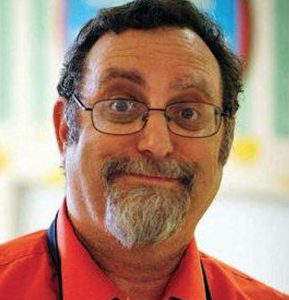Leavitt: Leaving Chicago — Letter to my daughter
By Irv Leavitt for Chronicle Media — August 29, 2018As you go off to college, I’m sitting here in the dark thinking about how to prepare you for life on your own.
I want you to be happy, and I really don’t know how that works.
I’m just going to tell you about who you came from, and how they handled their lives. Most of your relatives died before you were born, or soon after, so you don’t know much about them.
As far as the men on my side of the family, there isn’t much to say about us as parents. My grandfather — my father’s father — was uninterested in his family, and didn’t stay around much. That didn’t leave my own father much of an indication about how to be a parent, and you can probably tell that I didn’t learn much from him, either.
My dad did teach me a few important things. My favorite, though it’s a little blue, appeals to me because it’s layered: “If you’re going to kick a guy in the crotch, don’t miss.”
This is both literal and figurative.
The point is to remember to aim, and follow through. That’s because if he doesn’t go down and stay down, you’re in for a fight.
But that can’t always be avoided. Win a few, lose a few.
Jerry Leavitt also said, “Never do anything to take away another man’s job.” This goes for women, too, of course. It’s not always possible to follow this, but it’s good to think along those lines
“Don’t hire anyone you wouldn’t want at your kitchen table next to your sister.” I suppose that one is a bookend with the following: “You will be judged (in heaven?) by how you treat your employees.”
Dad’s business lasted only a few years, but that was apparently long enough to develop his ethics. When his little factory failed, everybody was paid what they had coming.
As a young man, I picked up the hauling business for the company Dad was selling for, so I got to see him work. Incredibly, he rarely told his customers what the prices were for the pots and pans and toilet paper I’d deliver the following day.
“If you’re not happy with the value, don’t buy from me anymore,” he’d say.
Other salesmen bribed buyers. Your grandfather didn’t.
I occasionally saw his customers spontaneously hug him. Cafeteria workers. Laborers. Nuns. He always looked embarrassed.
His mother, Grandma Ruth, was from the old country. Despite very little education, she had most of the responsibility to provide for her family. She seemed to have been creative about it.
Many summers, she left her job to take the train to the Jersey Shore so she could work in a family hot dog stand, and the kids could get out of Chicago.
She unintentionally originated a neighborhood catchphrase. When she produced some dark, weird, foreign dish, she’d note her audience’s lack of confidence and insist, “I tell you, it’s good.”
Everybody said that dad stepped up in class when he married Ritta. She was pretty and smart and had been a chief petty officer in the World War II Navy. When he met her, she was working at a big Loop club as what would now be called an administrative assistant.
She quit when they started having kids. If she had worked and Dad stayed home, they would probably have done better.
But as it was, your aunt Lee and I got the benefit of her time. She’d sit with us long after dinner, and listen admiringly to our tales of triumph and disaster. It was at her table that we learned how to respect ourselves and others, and how to speak English properly.
Grandma could hold a grudge. Even going back to the Navy days, they used to tell her, “Don’t be bitter, ‘Ritter.’”
She had high standards for people, and wouldn’t stand for them letting her down. I know you loved her, but don’t be like her in this. Forgiveness is a blessing to the giver.
One of the coolest things about your grandmother was that she would help people significantly, and never breathe a word about it.
“Where are you going?” I’d ask. “None of your business,” she’d reply, as she headed off to teach my dyslexic best friend how to read. I didn’t find out for decades.
Her father was, among other things, a Nashville pawnbroker and a Wabash Avenue diamond merchant. He took me fishing off the rocks along South Shore Drive, but also used to cuff me on the head for no particular reason.
“That’s for what I didn’t catch you doing,” he’d say.
When he wanted to rent an apartment in Uptown, he sent your great-grandmother in to talk to the landlord. She didn’t have a Jewish nose.
She died before I was born. She had ALS and breast cancer, and in those days, very little could be done about either.
You had your own mother for 11 years. She grew up on the South Side, one of seven children of a homemaker and an engineer on the Rock Island Line. Grandma was ill most of the time I knew her, but John Gallagher was healthy almost to the end.
He was one of the nicest men I ever met. He told jokes and laughed at those told by others. He liked you, and there’s a lot of him in you.
Your mother was the funniest person I knew. She made up little songs about all kinds of things, and puttered around the apartment singing them. You probably remember the best one, about our three cats.
She used to laugh at how they’d scatter when she made noise. She’d push the Hoover and gaily sing, “Vacuum up the kitties, vacuum up the kitties, suck them up and put them in the bag,” waving her free hand in the air as the hysterical little animals fled.
Once, at a shopping mall, you asked her what kind of a store you were passing, and she said, “That’s Old Navy – just like grandma.”
When she was your age, there weren’t many jobs available to young women, beyond nurse, secretary and teacher. She was a secretary, but went back to school to learn speech pathology, because it was better money, and helpful.
She was for years assigned to a Chicago Public School classroom that was illegally large, populated with kids with a variety of difficulties in learning and life. I remember when she came home beaten by one of her students, who probably couldn’t help himself.
Later, she was assigned to schools where she would teach in her own room. She would usually teach three kids, often hard-of-hearing, how to speak better — or speak for the first time — in a classroom fashioned from a couple of bathroom stalls.
She bought most of her supplies. She also bought presents for kids who passed progress milestones, and big gifts when they crossed the finish line, ready to face the world with command of unimpeded speech.
And then, of course, there’s your father, an old cab driver, bookseller and broken-down newspaper reporter. I’m good at picking industries that lose their vigor before their time.
You’re a fine artist and cartoonist, and you’ll get even better, quickly. I think your trade is solid and on the upswing, but I’m obviously not the right guy to ask.
Our family is special to us, but probably seems prosaic to most people.
We had traditional two-parent families, single parents, and absentee parents. There were women who were cheated out of careers, and others who cracked glass ceilings. There are underemployed and shiftless men, and dawn-to-dark working fools.
There were immigrants, and third-generation Americans, like you.
Among all those people mentioned, there are four college degrees. Mom had two of them.
Some of these people were happier than others. The happiest, it seems, were the women.
None seemed interested in possessions. For most of their lives, your mother, aunt, grandmothers and great-grandmothers never owned cars. They didn’t even drive, though most of them knew how.
As hackneyed and sexist as it may seem, they loved their families far more than they, or their husbands, loved their careers.
That may be because the careers were not all that hot.
The women all had good friends. A couple of them might have had more well-maintained friendships than all the men put together.
Your mother’s fondest wish was to have a family. That’s you. You were the most important part of her life, and of your father’s, too.
No matter what happens, no one will ever be as important.
You’ve always been better at making friends than I am. Meet new ones, and treasure them. You’ll need them later.
When your friends, and your relatives — what you have of those — disappoint you, don’t let them take advantage. But also remember that you come from a long line of damaged and imperfect people.
When I was a cabbie, I tried very hard to do the right thing, though I had a lot of opportunity to do wrong things. I met a lot of people doing a lot of things I didn’t think were wise. They probably didn’t think so, either.
But I got to wonder: How many people do stuff that they wouldn’t want their parents to know about? This was my answer: Eventually, all of them.
Here’s my advice to you.
You know those things that people do that they wouldn’t want their parents to know about?
Don’t do them.
Get your free subscription of the Cook County e-edition
—- Leavitt: Leaving Chicago — Letter to my daughter —









